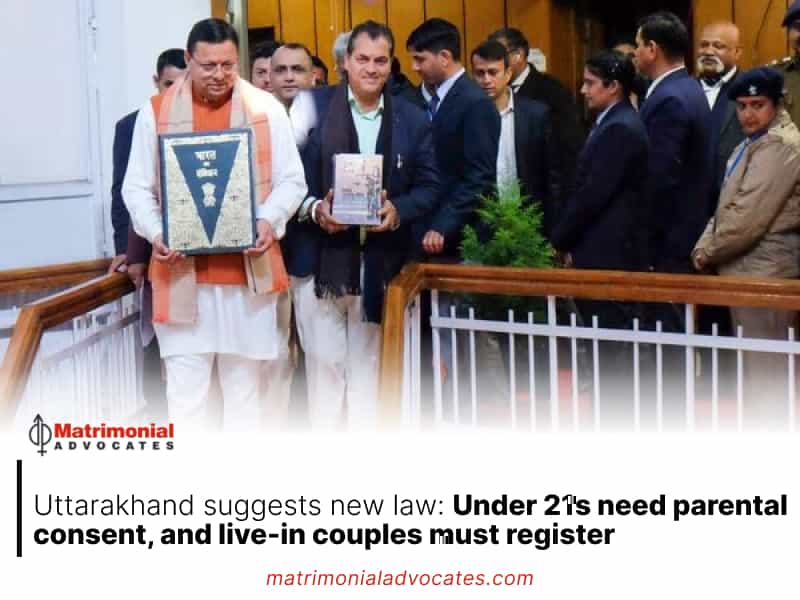
The Uttarakhand Uniform Civil Code (UCC) Bill, tabled in the Uttarakhand Assembly on Tuesday, includes provisions for the legal recognition of progeny born from cohabitational arrangements, among other stipulations.
One of the provisions outlined in the Uniform Civil Code mandates that the dissolution of formally registered cohabitational relationships necessitates the submission of a written declaration.
Under the Dehradun Mandate, upon the enactment of the Uniform Civil Code in Uttarakhand, individuals currently engaged in or intending to enter into cohabitational unions are compelled to register with district authorities. Furthermore, individuals below the age of 21 intending to cohabit must secure parental consent. This mandatory registration extends to individuals residing in Uttarakhand who are engaged in cohabitational relationships beyond the jurisdiction of the state.
Live-in relationships will not be registered in cases that are “against public policy and morality”, if one partner is married or in another relationship, if one partner is a minor, and if consent of one partner was obtained by “coercion, fraud, or misrepresentation (with regard to identity)”.
A senior official told NDTV a website is being prepped to accept details of live-in relationship, which will be verified with the District Registrar, who will conduct a “summary inquiry” to establish the validity of the relationship. To do so, he may summon either or both partners, or anybody else.
If registration is declined, the Registrar must provide a written explanation outlining the reasons for the refusal.
The “termination” of registered live-in relationships requires a written statement, in a “prescribed format” that can invite police investigation if the Registrar feels reasons for the relationship ending are “incorrect” or “suspicious”. Parents or guardians of those under 21 will also be informed.
Noncompliance with the requirement to submit declarations for cohabitational relationships or the provision of false information may result in imprisonment for a period not exceeding three months, a fine of ₹25,000, or both. Those who fail to register a cohabitational relationship may be subject to a maximum imprisonment term of six months, a fine of ₹25,000, or both. Even a minor delay in registration, such as by a month, may lead to imprisonment for a duration of up to three months, a fine of ₹10,000, or both.
Further significant provisions delineated in the section pertaining to cohabitational relationships within the Uniform Civil Code, presented in the proceedings of the Uttarakhand Assembly, include the legal acknowledgment of offspring born from such unions, thereby bestowing upon them the status of a “legitimate child of the couple”.
As articulated by the same authoritative source to NDTV, this entails the assurance that the rights of all children born outside of wedlock, whether from cohabitational arrangements or through surrogacy, will be uniform, thereby ensuring that no child can be deemed “illegitimate”.
Furthermore, the authoritative source underscored that under the Uniform Civil Code (UCC), all children will possess equal inheritance rights, encompassing parental assets. The UCC employs an inclusive lexicon, referencing “child” without differentiation between “son” and “daughter”.
Additionally, as per the UCC draft, a woman abandoned by her cohabitating partner is entitled to claim maintenance. However, the draft does not explicitly delineate the term “desertion”.
Exploring Uttarakhand’s Uniform Civil Code
The concept of a Uniform Civil Code (UCC) entails a comprehensive legal framework that applies uniformly to all citizens, irrespective of religious affiliations, governing various personal matters such as marriage, divorce, inheritance, and adoption. The implementation of a unified civil code in Uttarakhand represented a significant electoral pledge by the BJP during the preceding year’s assembly election, contributing to the party’s electoral triumph. A committee convened by the state, under the guidance of a retired Supreme Court justice, has compiled a 749-page report based on approximately 2.33 lakh written submissions and consultations with around 60,000 individuals. Among its recommendations are measures proposing the complete prohibition of polygamy and child marriage, the establishment of a uniform minimum age of marriage for girls across all religious communities, and the standardization of divorce procedures. Uttarakhand’s UCC initiative also seeks to outlaw practices such as ‘halala’ and ‘iddat’, which are Islamic customs imposing specific obligations on women following divorce or the death of their husband. Uttarakhand is not singular in advocating for a uniform civil code; Assam, similarly governed by the BJP, has announced plans to enact comparable regulations later this year. However, in both cases, tribal communities—a crucial constituency in each state—will be granted exemptions.





